“What’s in a name?” once asked the most famous of all entight-éd men in history.
Simple enough to answer, but now, what with the sudden upsurge of women in comedy, it’s also beginning to bear a whole new meaning and inspire a new series of headscratchers.
Any feminist will tell you that The Movement’s all about language, or that going deep, Inception-like, and changing minds by redefining sexist words.
[“Cunt”? More like “cunttastic!”]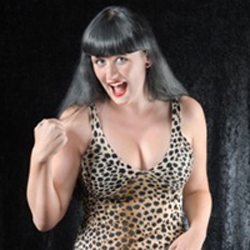
And it’s from here where The Bridesmaids Effect gets going.
The most interesting thing about Bridesmaids is that its title refers only to women. This isn’t new, but the fact remains that everything that happens after the title-card speaks to a new era in comedy. That is to say, the film boldly calls itself a film by and for women and still manages to appeal to audiences of all genders. The difference must be, then, in the content, which draws laughs both husky and high-pitched, thereby redefining “female comedy,” and, in turn, showing the world the true potential of the comedienne.
Maybe “chick flicks” aren’t just for chicks anymore, and maybe the genre tropes don’t have to be as limited.
Enter the fall 2011 TV season, which features such new estrogen-oriented shows as The New Girl, Two Broke Girls, Whitney, and Up All Night, all of which [except the last, obviously, as Will Arnett puts a damper on its solely-woman-ness] pull a page from Kristen Wiig’s book and don’t shy away from directly referring to their femininity.
But are these shows truly following in Bridesmaids‘s footsteps? Where will they take we comediennes?
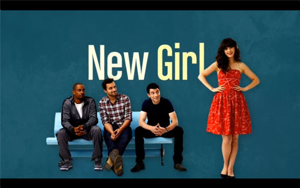 Let’s start with The New Girl. Before I saw the pilot, friends told me it could easily be retitled to Zooey Deschanel Is Adorable. So I didn’t have the highest hopes, regardless of my undying love of the She & Him singer, and, after finally watching it, just two thoughts crossed my mind: a.) Wow, ZD really is adorable; b.) Maybe the writers are taking their time with the whole “examination of modern-day guy-girl relationships.” The first because of her awkward stripper dance, the second because, while it is good to see guys and girls staying on either side of the friendship line, there’s still a sense of “‘girls’ can only be funny if they’re adorable and surrounded by men.” Essentially, it’s part of that First Wave mentality; a certified first step towards inducting pretty girls into the comedy arena. But, given the occasional hilarious scene and the mere context in which the characters find themselves, I’m holding on for a more developed plotline.
Let’s start with The New Girl. Before I saw the pilot, friends told me it could easily be retitled to Zooey Deschanel Is Adorable. So I didn’t have the highest hopes, regardless of my undying love of the She & Him singer, and, after finally watching it, just two thoughts crossed my mind: a.) Wow, ZD really is adorable; b.) Maybe the writers are taking their time with the whole “examination of modern-day guy-girl relationships.” The first because of her awkward stripper dance, the second because, while it is good to see guys and girls staying on either side of the friendship line, there’s still a sense of “‘girls’ can only be funny if they’re adorable and surrounded by men.” Essentially, it’s part of that First Wave mentality; a certified first step towards inducting pretty girls into the comedy arena. But, given the occasional hilarious scene and the mere context in which the characters find themselves, I’m holding on for a more developed plotline.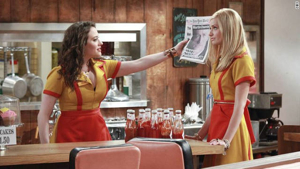
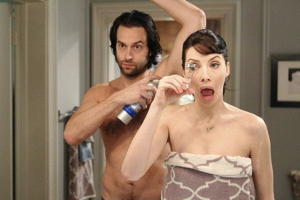 And then comes Whitney, a sitcom starring Two Broke Girls‘s co-creator, Whitney Cummings, and attempting to pay homage to its obvious inspiration, Roseanne, by showing the sassier side to marriage. Critics worry for the show, claiming the main character isn’t actually cheeky, but obnoxious. Whitney’s antics — the sharp judgment of others, for instance — have many feeling the comedienne’s trying too hard, with little reward. But is this true, or is the world still unprepared to push the envelope of so-called female-comedy even further than Bridesmaids? Would critics be as turned-off by the show if it were called Whitman, instead, with a word-vomiting male lead? All sitcoms start off with an awkward settling-down period, and, given Whitney Cummings’s talent on stage and in writing/producing Two Broke Girls, I’m definitely willing to give Whitney another shot.
And then comes Whitney, a sitcom starring Two Broke Girls‘s co-creator, Whitney Cummings, and attempting to pay homage to its obvious inspiration, Roseanne, by showing the sassier side to marriage. Critics worry for the show, claiming the main character isn’t actually cheeky, but obnoxious. Whitney’s antics — the sharp judgment of others, for instance — have many feeling the comedienne’s trying too hard, with little reward. But is this true, or is the world still unprepared to push the envelope of so-called female-comedy even further than Bridesmaids? Would critics be as turned-off by the show if it were called Whitman, instead, with a word-vomiting male lead? All sitcoms start off with an awkward settling-down period, and, given Whitney Cummings’s talent on stage and in writing/producing Two Broke Girls, I’m definitely willing to give Whitney another shot.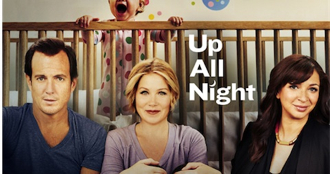
Rounding up the group is Up All Night, a new kind of family-comedy that reverses gender roles,completely; centering on both a man and a woman, it isn’t just a Girl Power show, so much as an interesting look at how men can tie in to the equation and both genders can work together to make something hilarious. True, it showcases the talents of Christina Applegate and Maya Rudolph, but Will Arnett isn’t afraid of taking a backseat to the Working Woman storyline and represent a modern man: one who doesn’t feel obligated to be the sole breadwinner. In fact, he’s a stay-at-home dad, voluntarily taking on that role because of how much his wife loves her job. True, occasionally they fall into gender norms, with Arnett being clueless in all things household, and Applegate being the glue, but at the end of the day they support one another and blur the gender binary — all while letting hilarity ensue.
—
All in all, the scope of female-driven comedy this fall is large, with various different approaches to rolling with the Bridesmaids wave. Some work well — Broke Girls and Up All Night, especially — and while the other two still need a spot of help, the fact that they exist, and that audiences are taking notice of the range of female talent, is hopeful.
